Johnny Hallyday: The story of a French rock phenomenon
- Published
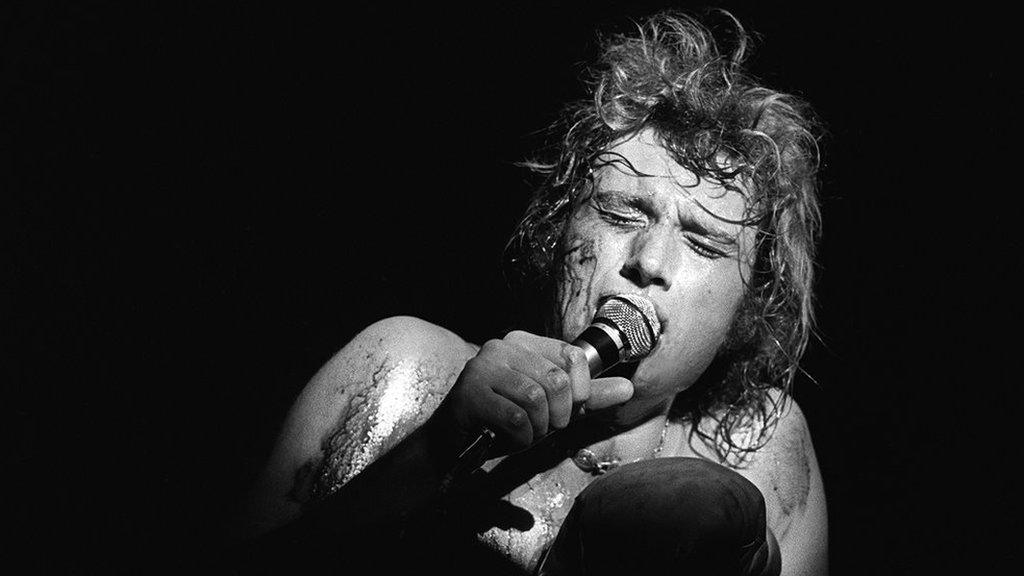
The star's early performances prompted scenes of hysteria in France
Rock star Johnny Hallyday, who has died at the age of 74, had phenomenal success in the French-speaking world.
The star, whose real name was Jean-Philippe Smet, sold more than 110 million records and starred in a number of films, including one directed by Jean-Luc Godard.
To mark 40 years in showbusiness, the French icon enjoyed a three-week residency at Paris's most famous venue, L'Olympia.
And he once performed before a million people in a mobile musical cavalcade down the Champs-Elysees.
The French called him "Our Johnny". Music critics called him "the French Elvis". To almost anyone else, he was the biggest rock star they'd never heard of.
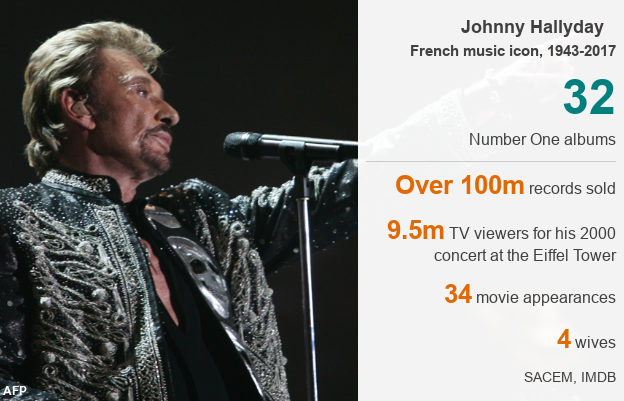
Despite 6,000 fans chartering flights from Paris to see him play Las Vegas in 1996, he failed to crack the American or any other English-speaking market.
That was partly because his songs were so derivative of American rock and roll, relying heavily on Francophone covers of standards like Presley's Hound Dog, Little Richard's Tutti Frutti and Chubby Checker's Let's Twist Again.
But whatever you thought of his music, Hallyday's stage presence was undeniable. He was a hip-swinging bolt of lightning, a sexually-charged wild man of rock, and a danger to public decency.
When he played the Festival de Rock in early 1961, he triggered a near riot that led to a ban on rock and roll shows for several months.
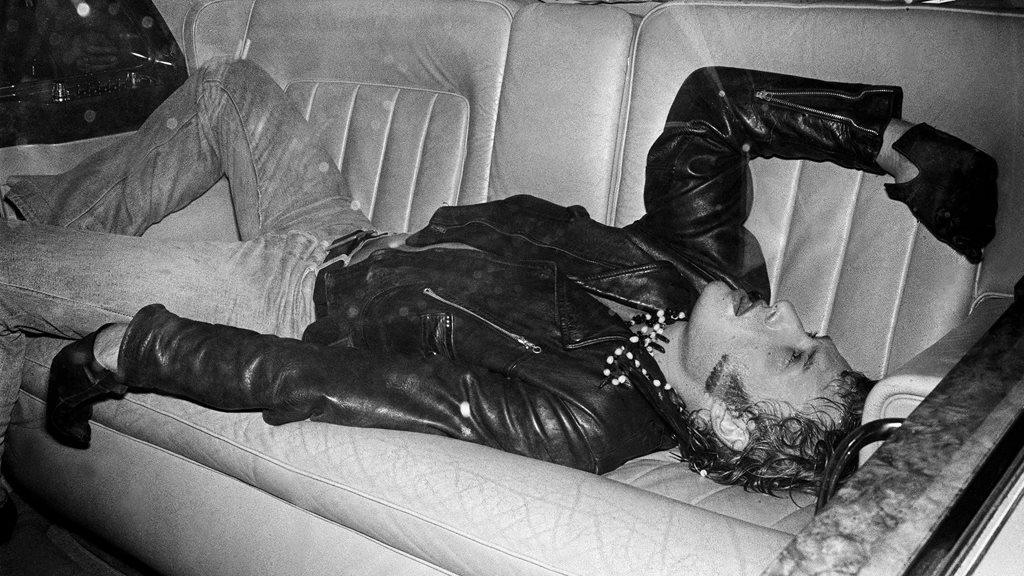
Hallyday shocked the French establishment in the early 1960s
"He introduced rock and roll to France," journalist Philippe Le Corre told the BBC in 2000.
"He's one of the few singers about whom people say that he's an animal on stage. He's quite incredible."
Jean-Philippe Smet was born to a Belgian actor father and a fashion model mother in 1943. But he was abandoned as a baby and raised by his aunt, whose two daughters were ballerinas.
When one of them got a job in London, the family moved to the UK. There his cousin Desta fell in love with American "cowboy" Lee Halliday, who took Jean-Philippe under his wing and taught him guitar. The star would later adopt his name for the stage as a tribute.
By the age of nine, Jean-Philippe was already performing on stage, singing songs like The Ballad of Davy Crockett during his relatives' costume changes.
His life changed when he saw the 1957 Presley film Loving You. "His voice, the way he moved, everything was sexy," Hallyday told USA Today in 2000. "The first time I saw him, I was paralysed."
The teenager immediately curled his lip into a sneer and set his sights on stardom.
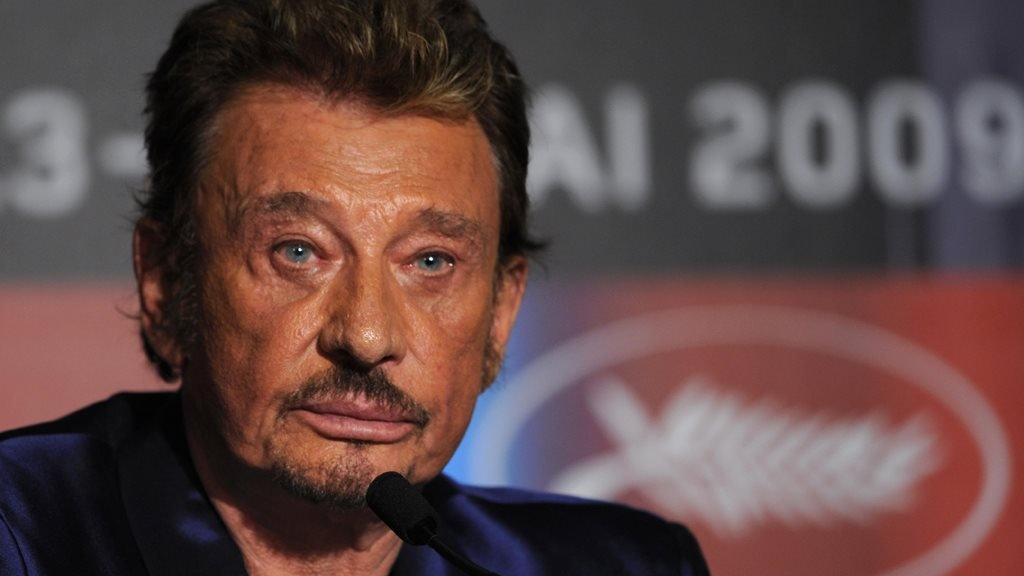
The star met his first wife on the set of 1963's Where Are You From, Johnny?
He caught his big break in late 1959, when an appearance on the Paris Cocktail television show led to a record contract with Vogue.
His debut single, Laisse les Filles, was released in early 1960, while its follow-up, Souvenirs, Souvenirs, made him a fully-fledged teen idol.
Within two years Hallyday became France's highest-paid music star.
Like Elvis, a spell in military service in 1964 gave him an air of respectability with the mainstream public. But when he returned to the limelight, he found himself playing second fiddle to emerging stars like The Beatles and Bob Dylan.
It didn't help that he appeared to dismiss the love generation with the scathing song Cheveux Longs, Idees Courtes (Long Hair, Short Ideas) in 1966.
But he proved to be the ultimate musical survivor, adapting his style to incorporate psychedelia and prog rock before settling into the more comfortable styles of blues, country and balladry that sustained his career into his 70s.
He even attempted a rock opera, 1976's Hamlet, which was a rare misfire. ''I like the story of Hamlet,'' he explained in the album's spoken prologue. ''I don't know exactly why. There are certainly reasons, profound reasons. But it is not important."
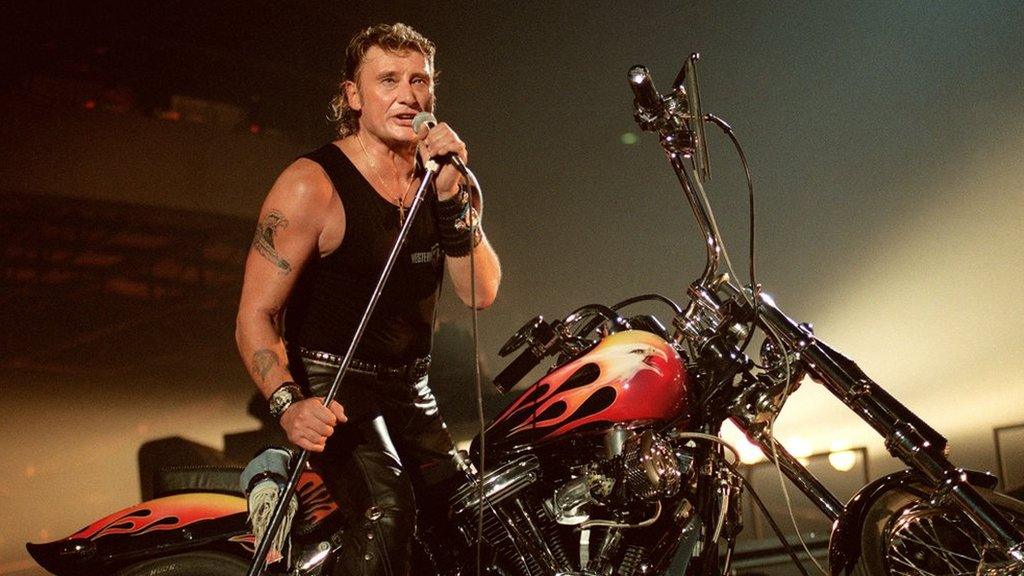
The star's love of fast cars and motorsports was often reflected in his stage shows
Off the stage, the star's turbulent personal life fascinated the French public. He was married four times, and attempted suicide twice.
His cocaine use, chronic tax problems and a devastating motorcycle accident were all fodder for tabloid newspapers.
The star put his problems down to his unhappy childhood, which he tried to obliterate with alcohol, opium and cannabis.
"For a long time I couldn't get out of bed in the morning without cocaine," he admitted in 1998.
Rather than destroy his career, Hallyday's misdemeanours only made fans love him more - and he was savvy enough to realise it.
After he split and reconciled with his first wife, actress Sylvie Vartan, in 1973, the couple recorded a duet, J'ai un Probleme, which became one of the year's biggest hits.
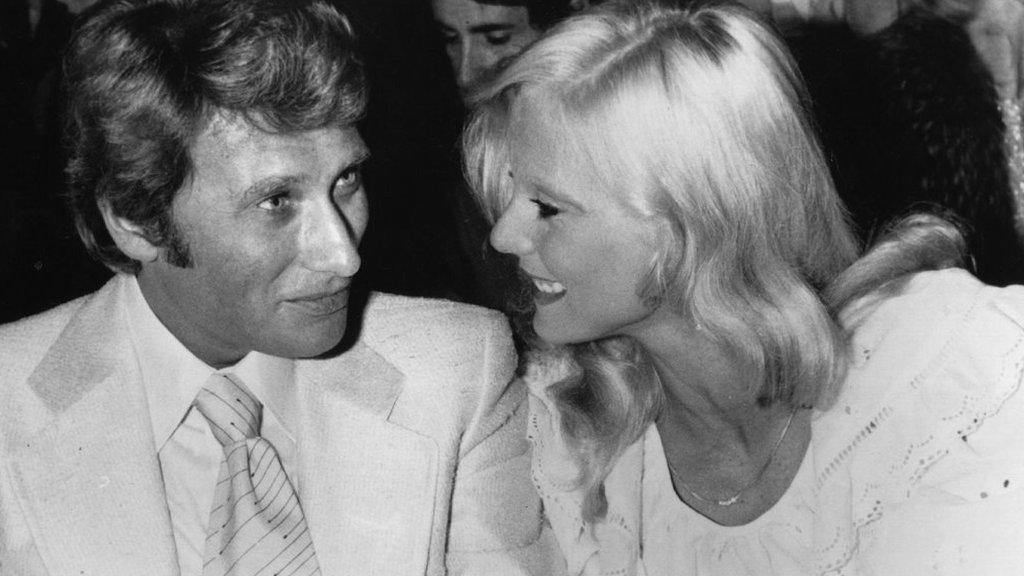
The star's love affair with Sylvie Vartan was a national obsession
In 1997, his contribution to French culture was recognised by President Chirac, who awarded him the Chevalier of the Legion d'Honneur.
Three years later, he performed to half a million fans at an outdoor concert at the Eiffel Tower. Another 9.5 million watched the show on television - about one-sixth of the population of France.
However, his career was not totally trouble-free.
In 2005 he lost a legal battle with his record label, Universal, over control of some 1,000 master copies of his songs.
He was also accused of rape by a former employee in 2003, though no charges were ever brought.
The singer's fans were plunged into premature mourning in 2009 when false rumours circulated he had died on the operating table while receiving treatment for a slipped disc.
In fact, the star was just in a medically-induced coma after picking up an infection. But the story was persistent enough that the surgeon who carried out the initial operation was attacked on the streets of Paris.
Hallyday later laughed off his brush with death. "The first time I died I didn't like it so I came back," he said.
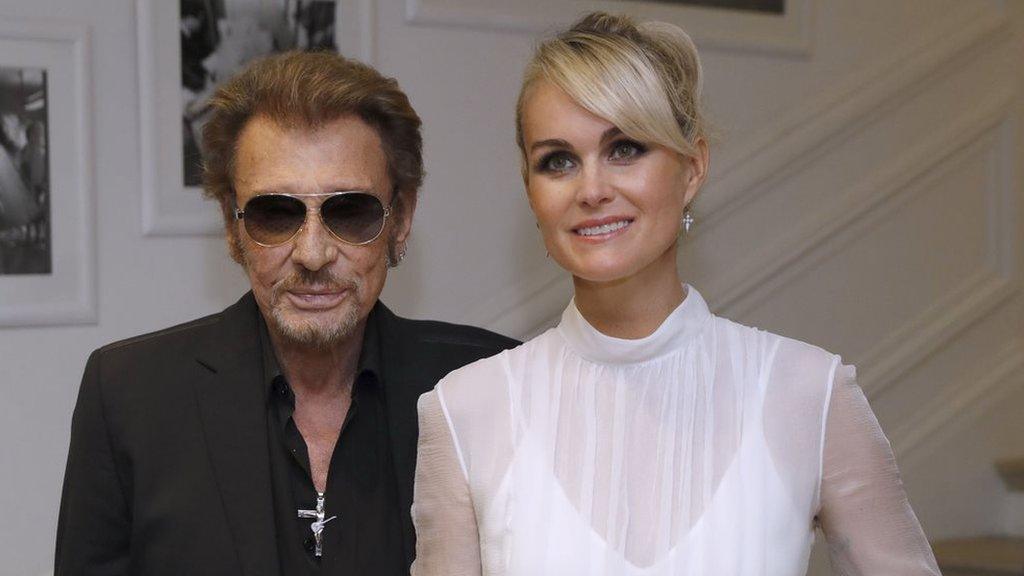
The star's fourth wife, Laeticia Boudou, confirmed his death from lung cancer
In later years the star mellowed - doting on his fourth wife, Laeticia Boudou, and their two children, whom they adopted from Vietnam.
And while his lack of success outside France had once been a source of frustration, it eventually became a relief.
When he wasn't selling out arenas at home, he was able to live in relative anonymity in Los Angeles, where he counted Tom Hanks and Ben Affleck as neighbours.
"I am not 20 years old any more," he said in 2009. "Perhaps I'm a little tired of playing Johnny Hallyday. I want to be Jean-Philippe Smet again."
In March, the star revealed he was being treated for lung cancer. But he said the condition was not life-threatening and called media reports to the contrary "a pack of lies".
The treatment was unsuccessful and the pop icon's wife confirmed his death on Wednesday.
"Johnny Hallyday has left us," she said in a statement to the Agence France Presse news agency.
"I write these words without believing them. But yet, it's true. My man is no longer with us."

Follow us on Facebook, external, on Twitter @BBCNewsEnts, external, or on Instagram at bbcnewsents, external. If you have a story suggestion email entertainment.news@bbc.co.uk, external.

- Published6 December 2017
